Frequently Asked Questions About Chronic Kidney Disease Prevention

1. What are the early signs and symptoms of chronic kidney disease?
Early signs and symptoms of CKD may be subtle and can often go unnoticed. Some common early indicators include:
• Fatigue and weakness
• Swelling in the ankles, feet, or legs
• Changes in urine output, color, or frequency
• Nausea and vomiting
• Loss of appetite
• Persistent itching
• Trouble sleeping
It’s essential to consult your healthcare provider if you experience any of these symptoms, as early detection and treatment can help slow the progression of CKD.
2. Can chronic kidney disease be reversed?
While CKD cannot be entirely reversed, early detection and proper management can help slow its progression and prevent further damage to the kidneys. Treatment strategies may include addressing underlying causes, such as high blood pressure or diabetes, adopting a kidney-friendly diet, and making lifestyle changes to support kidney health.
3. Is exercise safe for people with chronic kidney disease?
Yes, exercise is generally safe and beneficial for people with CKD. Regular physical activity can help manage blood pressure, control blood sugar levels, maintain a healthy weight, and improve overall well-being. However, it’s essential to consult your healthcare provider before starting an exercise program, as they can help you determine the appropriate type and intensity of exercise based on your individual needs and health status.
4. Can I prevent chronic kidney disease if I have a family history of the condition?
While having a family history of CKD may increase your risk, it doesn’t guarantee that you will develop the condition. By following the prevention tips outlined in this article, such as managing blood pressure, adopting a kidney-friendly diet, and staying active, you can reduce your risk of developing CKD, even with a family history.
5. How often should I get my kidney function checked?
The frequency of kidney function tests depends on your individual risk factors and health status. Generally, people with a higher risk of CKD, such as those with diabetes, high blood pressure, or a family history of kidney disease, should have their kidney function checked at least once a year. If you have existing kidney problems, your healthcare provider may recommend more frequent testing. It’s essential to discuss your specific needs and risk factors with your healthcare provider to determine the appropriate testing schedule for you.
Conclusion: 10 Chronic Kidney Disease Prevention Tips
In conclusion, chronic kidney disease is a serious condition that can significantly impact your quality of life. By taking proactive steps and following the prevention tips outlined in this article, you can minimize your risk of developing CKD and maintain optimal kidney health. Prioritizing lifestyle changes such as managing blood pressure, staying active, adopting a kidney-friendly diet, and getting regular check-ups can have a lasting impact on your overall well-being. Remember to consult with your healthcare provider for personalized guidance and support in your journey to protect your kidneys and promote a healthy lifestyle.